Course Brief
Unit Abstract
With the increasing concerns regarding climate change arising from increasing carbon dioxide levels and other adverse environmental impacts of industrial processes, there are widespread economic, ethical, legislative and social pressures on engineers to develop technologies and processes that have reduced carbon and
environmental impact.
The aim of this unit is to introduce students to renewable energy resources and technologies, including current storage and generation technologies, and explore their advantages and limitations.
On successful completion of this unit students will be able to determine the optimum combination of renewable energy technologies and evaluate their efficiencies, describe how to conduct a cost–benefit analysis to determine the most viable option between renewable and conventional energy sources, and consider the relevant political, socio-economic and legal factors that influence the selection of appropriate energy technologies.
- This course is offered in 45 hours.
-
BTEC Higher National Diploma (HND) in Engineering (Electrical and Electronic Engineering)
The Pearson BTEC Higher National Diploma (HND) in Engineering (Electrical and Electronic Engineering) will develop students into highly trained, competent professionals, who are able to meet the demands of employers in the various engineering sectors.
This qualification also serves as the next step for students completing the SBCS Diploma in Electrical and Mechanical Engineering Technology programme and are interested in pursuing the BEng (Hons) in Electrical and Electronic Engineering (Technology).
Why choose the HND in Engineering (Electrical and Electronic Engineering)?
- Recognition: This is an Internationally recognized qualification, recognized in more than 70 countries worldwide.
- Final Year Entry: Graduates of this programme gain direct access to the final year of the University of Greenwich's B.Eng. in Electrical and Electronic Engineering (Technology) programme offered at SBCS, Champs Fleurs campus.
- Career-focused: The curriculum was developed to meet the needs of the current marketplace after consultation with employers, students, and professional bodies.
- Practical hands-on training: Emphasis is placed on practical training and the application of the knowledge taught.
Why study Electrical and Electronic Engineering at SBCS?
- Instructors are certified, highly skilled and experienced practitioners who bring their knowledge and work experience to the classroom.
- Modern, fully equipped labs. You learn using the same equipment you will encounter in the field.
- Convenient class schedules. Work, Earn and Study at the same time. Classes are offered on a part-time basis, which allows working individuals to balance their work and educational needs.
Electrical and Electronic Engineering promo video

Our Labs
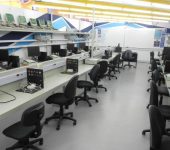
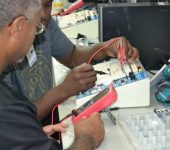
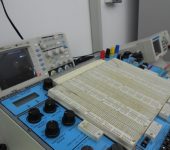
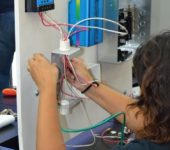
Our Campus



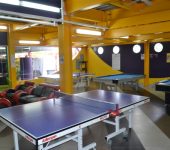
Schedule & Fees
The next intake for this offering will be in January 2026.
For more details on fees and courses Download the Programme Brief
FEE AMOUNT NOTE SBCS Registration Fee TT$850 each semester
Payable upon registration every semester (for 6 semesters) Tuition Fee TT$2,200 (per 15 credit module) (Cash Price)
TT$4,400 (per 30 credit module) (Cash Price) OR
TT$2,400 (per 15 credit module) (Credit Price)
TT$4,800 (per 30 credit module) (Credit Price)
Total Tuition Fee over 2 years: TT$35,200 (Cash Price) OR TT$38,400 (Credit Price)
BTEC Registration and Annual Fees £600
Payable by: February 2026
Please note: All information provided is subject to change without prior notice.
What's Next?